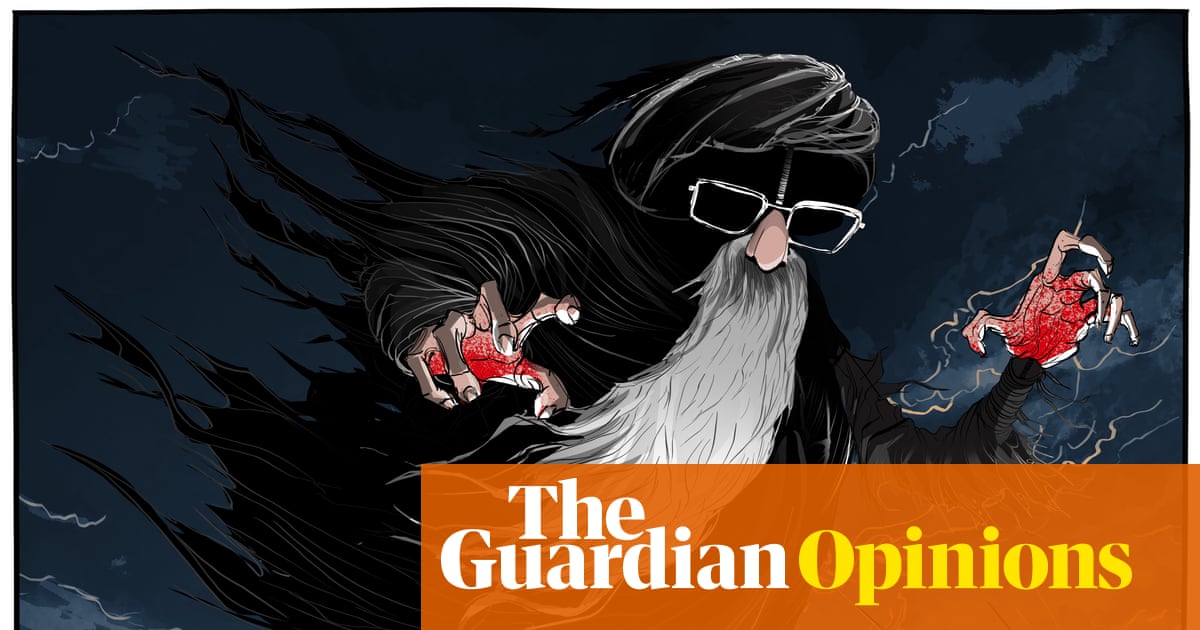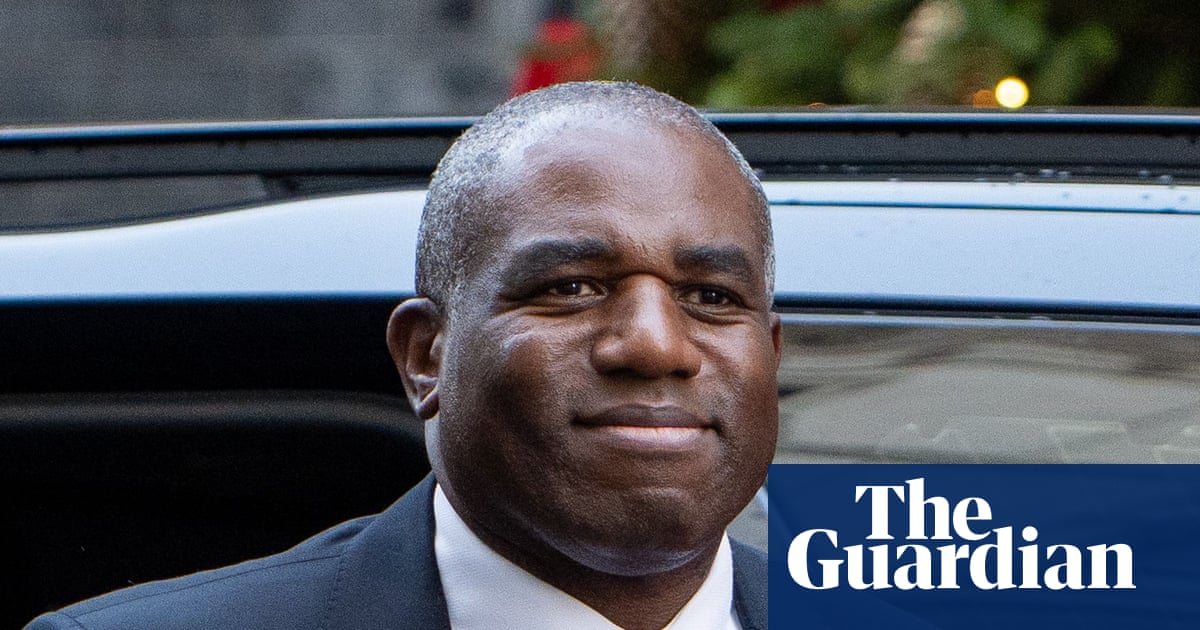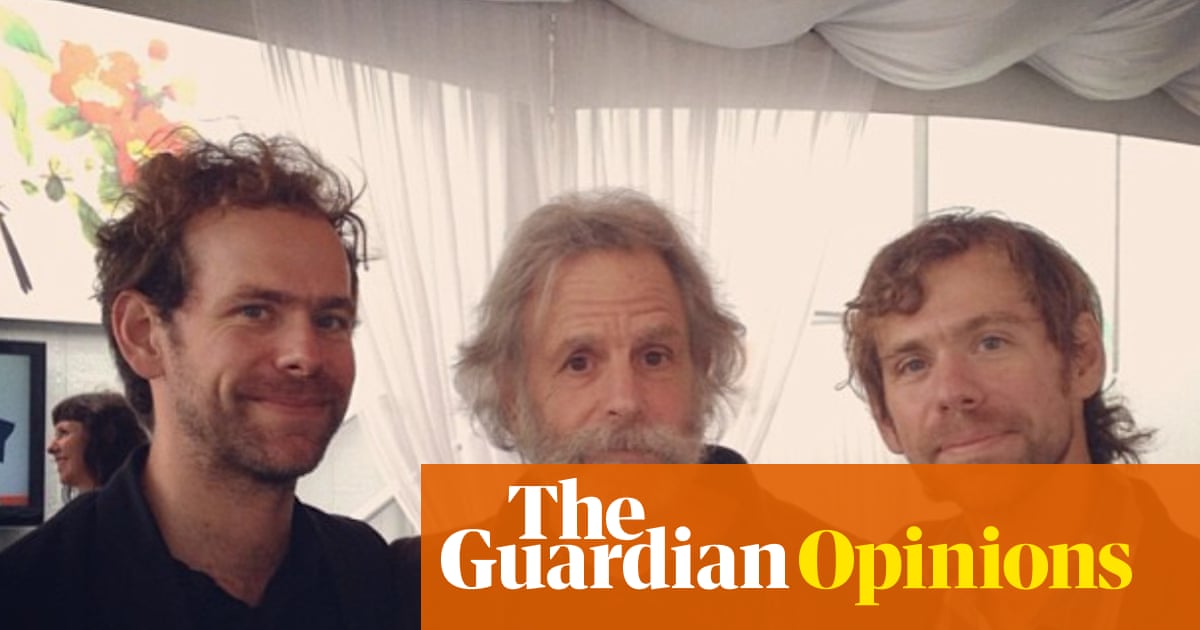“You are the reason women hate men,” a woman commented on one of my Instagram posts. “You don’t deserve Jessica, you schmuck,” another said in a direct message on Facebook. “I hope you’ve gotten the help you need and set your poor wife free,” wrote a third.
I am a novelist who relishes connecting with his audience. That disposition has suffered. The reason: three months ago, the US network Showtime aired the latest season of the documentary series Couples Therapy, on which my wife Jessica and I appeared as one of the pairs.
The series depicts four couples in 18 or so sessions of free therapy with Dr Orna Guralnik, a renowned New York psychoanalyst. The show is unscripted, and tries to avoid sensationalism. Participants are not paid, except for a modest stipend to cover childcare and transportation. The therapy takes place in a spacious office designed in the muted tones of the High Analyst style. The impression is that one is on New York’s Upper West Side rather than a recording studio in Greenpoint, Brooklyn. (The cameras are so invisible that it was always startling when, in the middle of one tear-filled testimonial or another, one heard discreet coughing on the other side of what suddenly sounded like very thin walls.) Though filming was always preceded by green-room small talk with the producers, we never crossed paths with the other couples.
Reportedly, millions of people watch the show, which airs on the BBC in the UK. At a time of deep global division, many of these viewers have found a way to agree that I may be the worst man in America – beyond redemption or, worse, understanding. “We ride at dawn for you, Jessica,” went a recent comment on a TikTok Jessica made in response to the show. It’s astonishing that tens of thousands of people debate the relationships on the programme with the intensity and detail that they do – so much so that some of them have been compelled to eviscerate me in direct messages. It’s surreal to have reams of strangers discussing your marriage with a certainty that has eluded you despite a decade of effort in the relationship itself.
At the time we applied to be on Couples Therapy, Jessica and I had been arguing almost since we began dating in 2015. We met at a restaurant where I was moonlighting as a line cook and she as a singer, though I was a novelist and she owned a bookstore. Two weeks later, she called me from a Lakota Sioux kids’ camp, where she volunteered as a counsellor every summer, to say that the cook hadn’t shown up. The next day, I caught a flight to Denver.
Our attraction and the magnificent conversations we had – hours at a time, at the restaurant, on the phone, by a campfire – made us wish to defy our radically dissimilar origins: a Jewish-Soviet immigrant from a family of boundary-crossers who couldn’t get his brain to slow down, and the easygoing daughter of a typically decorous Wasp family from Seattle. She wanted ferment, and I wanted serenity. We thought we could give that to each other. Instead, my bluntness made Jessica feel criticised, and Jessica’s reticence made it difficult for me to understand what she wanted. And yet, even on the hardest days, there remained a connection that felt too special to give up without trying everything. It was strained further by multiple relocations, but reinforced by the appearance of two children, now six and three.
We applied because we had seen the opening season, which featured a couple who found their way to a better place thanks to Dr Guralnik. Also, couples counselling can cost $300-400 an hour, and $700 or more with someone like Dr Guralnik. That wasn’t money we had – I was a fiction writer, and Jessica was in the early stages of a career as a psychotherapist herself. Admittedly, it’s naive to give a TV show your most vulnerable self and expect nuance in return. But that’s what I counted on from a series that stakes its reputation on the idea of sincere inquiry, especially when the subject is as sensitive and complicated as marriage. Honestly, I wasn’t even thinking about this. I wanted to save my marriage. I was desperate for help.
Instead, we became part of a shallow, confusing story of reductive characterisations and disappointing omissions. The therapy itself was so unhelpful, only increasing our conflict, that we quit after four sessions. But the lack of nuance became fully apparent only on the screen, after editing. (Jessica and I watched the episodes separately. I wasn’t planning on watching them, but the intensity of the online vitriol made it feel necessary.) Certainly, we failed to convey ourselves as articulately as we might have. But we told a clearer and more complicated story than the one that appeared onscreen.
By including no fill-in to-camera interviews – presumably to distance Couples Therapy from the feel of a typical reality show – the film-makers set themselves a difficult task: to scrape together a coherent story without jumping around between sessions, and despite the fact that patients hardly tell a coherent story themselves. The cost of this, and not just in our segment, is a mess of unclarity.
For instance, in the first episode, I begin to try to explain why one of our recent relocations, from Montana to New Jersey, has left me feeling as if our lives are much harder than they were. But I don’t get to continue, let alone finish. Then Jessica tries to explain why Montana was wrong for her. I say, “I disagree with that narrative.” Dr Guralnik doesn’t prompt me to say why. At the end of the first episode, it feels as if only a mind-reader can understand our issues. Watching the episodes, even I couldn’t say why I disagreed with Jessica’s narrative of our lives in Montana.
In the second episode, Jessica says that I end up taking care of so many family tasks because I don’t trust her to do them well. As an example, she talks about my having taken her to task for buying expensive tomatoes. Dr Guralnik doesn’t have us say more, or dig deeper.
The episodes continue in a similar style. Boris is frustrated with something or other about Jessica and their lives, and Jessica is tired of feeling inadequate. Boris is hot-tempered, voluble and vocal. Jessica is hurt, weary and withdrawn. At Dr Guralnik’s prompting, the conversation flits frantically between stories that rarely make sense, let alone culminate. The only thing that feels obvious, in a mushroom-cloud way, is that a loud man has all sorts of problems with an exhausted woman. Certainly, that’s what the internet decided.
Of course, there are painfully clear moments, too. I speak callously to Jessica, blind to the ways my behaviour also makes her suffer. In a particularly shameful moment, she acknowledges my distress and I cruelly dismiss her gesture. For the most part, though, you hear me ranting about water filters and vague pleas for “understanding” and “solutions” – a crazy person if you ever saw one. And I was. But not only.
After the fourth session, I wrote to one of the producers to say we wouldn’t be returning. It felt like relief rather than failure. I was certain that we would not be featured on the show because our involvement was so truncated. (Once the network decided to include us anyway, I did not object, as I felt I had made a commitment.)
Several months later, we returned for a final session because the film-makers invited us to give a coda to our aborted treatment. In the interim, we had experienced a reprieve in our conflict. In a quixotic bid for reconnection, I had staged an extravaganza in New York City for Jessica’s 40th birthday, and the time alone had helped us to remember, even if temporarily, what had once made it so nice to be together. Critically, however, the film-makers don’t make clear that they invited us back. The lacunae prompted viewers to again project their darkest imaginings: they asked to come back to put lipstick on the pig of their earlier sessions. Or: Boris forced Jessica to return and tell a false story of improvement so he wouldn’t look as bad. And so on.
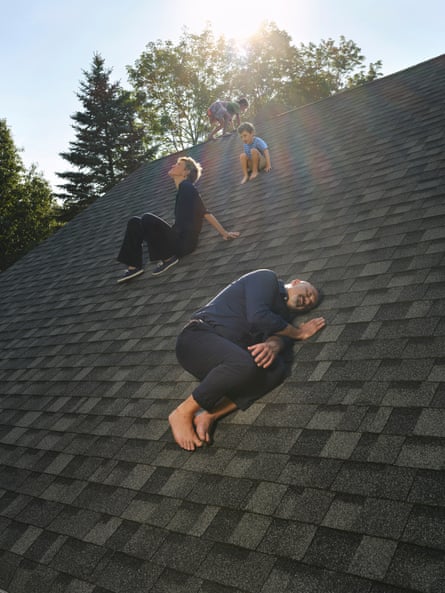
The show is full of such omissions. Viewers never learn that the episodes were filmed two years ago, a much longer lead time than usual for the programme. (Airing seems to have been delayed by Showtime’s merger with Paramount+.) The film-makers also obscure how quickly we quit. They stretch out our sessions to appear in seven of the season’s nine episodes, which is part of the reason so many viewers experienced the reprieve of our coda episode as a manipulation. It feels as if it were filmed only a week or two after we quit in extreme distress.
Viewers have responded accordingly. “I hope [Jessica] left you since the show,” the Facebook message mentioned above went on. “She can do so so so much better. She’s a sweet wife and you don’t care about her or appreciate her and you speak like a pretentious asshole too.”
And these are just the direct messages. I’ve done my best to keep news of the show away from my parents. The friends who get in touch, either in puzzlement or frustration on my behalf, are easier to address than all those people I know who, I imagine, have watched the show and decided I must be a monster without giving me the chance to offer nuance.
I’ve mostly avoided the public comments on Reddit and TikTok, so many of which feel like projections of every relationship misdeed the commenter has endured. And yet, it’s hard to withstand so many instances of insult and cruelty – especially when you know the real story is much more complex.
I was born Jewish – that is, second class – in the Soviet Union. When I was nine, my parents and grandparents became political refugees to the United States so I, the only descendant, could have a chance at equality. Because I learned English before they did, I was put in charge of their wellbeing. I spent my adolescence making decisions that no young person should make. I lived in constant dread of coming up short for these people who had sacrificed so much for me.
I became an optimiser. More was always more; I could always do better. I dreamed of fleeing my family – the only way I could imagine getting away from the taskload. But first, my grandmother, a Holocaust survivor, was dying. Then my grandfather. How could I abandon them? My family defined love as proximity. A properly individualistic American would have wished them good day as the exhaust of his tailpipe obscured their stricken faces in the rearview mirror. But I couldn’t find the fortitude, or cowardice, to break their hearts in that way.
But neither could I give them everything they wanted. Against their hopes, I became a writer, the worst thing I could do for the financial anxiety that so many persecuted immigrants feel, which I inherited from them. But nothing else made me feel so alive. In my first year, I made $22,000, by all accounts a resounding success.
Meanwhile, Jessica was a paragon of the moderation that eluded me: an excellent student who was not interested in the Ivy League; a talented singer who was not interested in a music career; someone who didn’t need to turn over every rock to see if she had found the best treasure. She had a very reasonable definition of treasure.
Jessica loved New York, where we met. However, she indulged my desire to flee, which now felt more explainable on account of her appearance in my life. It wasn’t only to separate from family that I wanted to leave. Despite its vibrancy, New York has always been a difficult place for me, partly because of its expense. We tried Miami, thinking the sun and sea would soothe us, but we missed New York’s edge and irreverence. For me, New York is like that girl you wish you’d never met – you can’t be together, but everyone else pales in comparison. It’s Jessica as a city.
after newsletter promotion
Back in New York, Jessica was thrilled and I was miserable. It was then that I received a tenure-track university teaching position in Montana. About 20 such jobs become available in fiction every year in the US as a whole. Finally, after more than a decade of cobbling together my income, I had an offer of something resembling security as a writer. Again, Jessica, who was able to work remotely because of the pandemic, generously agreed to move.
But Jessica was as dejected in Montana as I had been in New York. What does one do when there is so much connection, but practical circumstances literally point in different directions? Removed from my homeland at a formative age, relocated to a place where I felt ill at ease, my eternal pursuit of a home was easy to ridicule as perfectionism. Meanwhile, Jessica had long ago found her Eden. She had accommodated me twice. It felt like her turn. And it was time to give the kids a steady home. Two years away from tenure, I resigned my position and we returned to the only part of the New York area where we could afford a home: rural New Jersey.
It was our eighth home in four years. (There were other short-term moves related to the pandemic. We once calculated that our daughter had slept in 10 different beds by the time she was three.) We had spent these years endlessly packing and unpacking, learning new cities and jobs, creating and losing community, and trying to take care of little children, all without family near – circumstances that made it very difficult to be our best selves with each other. Now we were homeowners, too. I had no income; a home far away from essentials in an area I had been trying to flee most of my life; and a lot of house to constantly mend. You haven’t lived until you’ve had an infant and a toddler and your water is out for a week.
As had been our pattern for years, I went after most of these tasks first. Jessica’s habit was to go slow, in case things resolved themselves; sometimes they did, and sometimes they got worse. Mine was to anticipate problems before they occurred; sometimes that was wise, and sometimes I ended up fixing problems that didn’t need fixing. This meant that I rented and bought our homes; dealt with our landlords; organised our moves; figured out our health insurance; filed our taxes; fixed the small things and found professionals for the big ones; did the shopping and cooking; planned the trips; and dreamed up diversions for the kids – all while trying to figure out new ways to make money. Even in our darkest moments, I made Jessica coffee in the morning and a sandwich for her train ride into New York City for work.
It was too much to manage, and I had been managing so much for so long. I pleaded with Jessica to help. But she was struggling with her own difficulties: recovering from pregnancies, trying to advance in the first years of a career that had yet to pay well, often taking the lead on the kids. She was also very tired from our endless fighting. All the same, she said she would help. But then she forgot. I’d ask again. She’d apologise – and then she wouldn’t do it again, or do the job partway.
I would offer that this problem existed in part because of me – I wanted to price-check more plumbers than she did. I was ready to build a bridge of compromise if she had ideas on how. She didn’t. So I offered some of my own. But this back-and-forth required more energy and creativity than she had, or wanted to put forward, and so she just promised she’d help more. But she rarely did. On it went this way, until I became apoplectic with resentment. And then she did, too. But only I shouted. She retreated into herself. On a screen, unlike in life, only one of these behaviours feels toxic.
By the time filming began, nearly a year after we’d applied, things between us were even worse. I was in despair at the mistake I’d made in moving back. But when I tried to discuss this with Jessica, I encountered a wall. As she confessed later, she couldn’t sympathise with me because she was afraid that if she did, I would receive it as acquiescence to my pressure to move us away from New York again. She was angry at being asked to give up a home that was finally hers, and was past the point of caring for me. (These are her words – she has read this essay.) I was desperate for my life partner to at least acknowledge what I’d given up and what I’d come back to. But I couldn’t get her to do that.
That’s the couple viewers meet on Couples Therapy. Except it isn’t. Very little of the above context – heartbreaking, nuanced, full of love and mistakes by both sides – makes it into the show, even though we tried to share these complexities in our sessions.
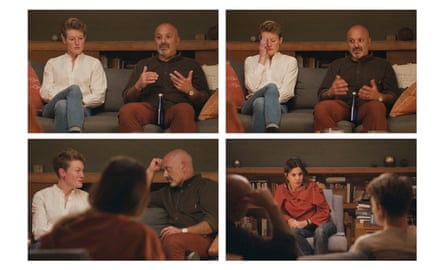
Not only the storytelling is reductive. Whether it’s the therapy or the editing, the treatment itself is so one-sided, so focused on my problems and behaviour, that many online commenters can’t recall Jessica’s name. (The misrepresentations she has experienced, which include assumptions that she is autistic or mentally unwell, are the reason she has recorded TikTok videos in reply. These videos also discuss how she handles with her own patients the treatment issues we faced with Dr Guralnik.) In that final coda session, after I describe the 40th-birthday weekend I conceived for Jessica, at Dr Guralnik’s prompting Jessica tells a very attentive, sensitive story about how she sees me. And that is where the exchange ends. Dr Guralnik fails to ask the same thing of me. (As I fail to insist on providing it.)
This happened a lot. Dr Guralnik was scrupulous about turning the mic over to Jessica, but on the show, I speak most of the time. Certainly not a good reflection on me, but if we could fix this ourselves, we wouldn’t have needed therapy. The show alternates Dr Guralnik’s consultations with the couples with her own supervision and advisory sessions, first with a clinical adviser named Virginia Goldner, then with a broader circle of fellow therapists. At one point, Dr Guralnik wisely tells Dr Goldner that I need “containment”, which I understand as a combination of being reined in but also persuaded that I don’t have to say so much to be understood. But she never contains me. Even after I interrupt Jessica at one point to say that “we’ll get to you” – an outrageous statement from someone who has been talking nonstop – Dr Guralnik says nothing.
As for my search for acknowledgment from Jessica, Dr Guralnik felt that it was my job to take care of myself. She tells Dr Goldner she said to me: “‘This is not something you can ask of a partner. This is your existential plight. It’s not a shared plight. It’s yours.’ [Boris] can’t stand that.” As I watched, my mind went back to a terrible patch that Jessica went through with an abusive remote New York employer when we were living in Montana. What if, as Jessica trembled and wept at the dinner table, I had smiled in a hollow way and changed the subject? Instead I held her hand, asked questions and cried with her. Indeed, I gave up my professional security so she could have hers.
As for Dr Guralnik’s sessions with her circle of therapeutic advisers, one of them scoffs at my naivety in believing that home could be anywhere but the mind – as if Arizona and Florida have to mean the same thing to a person with a respiratory ailment; as if totalitarian Belarus and free Latvia will feel the same if only a person gets his brain right; as if the United States and a western European social democracy must be synonyms to a person raised under socialism.
As I watched, I felt deeply insulted – as I was by Dr Guralnik’s assessment, so poisonously familiar from other therapies, of disagreement on my part as a refusal to see the light, to get treated. “He identifies with me only when I am 100% empathetic,” she says – painful to hear considering I repeatedly admit error throughout the sessions. “The moment I establish any kind of difference between his experience and my interpretation, I [am] just, like, useless to him.”
Sometimes, therapists are healers. Dr Guralnik has helped to heal many; she was incredibly warm to me and Jessica. She sensed the therapy wasn’t working, and sought solutions from peers, literature and her own reflections. But sometimes, therapists are as limited as we civilians. The problem is that their limitations too often get another name: authority.
Eventually, on my own and through conversations with Jessica, I came to understand what I needed to do to become more of the partner Jessica wanted, regardless of the form our relationship took. This process obeyed no formula or self-help shorthand. I can only describe it as an experience of great searching, humbling and circuitousness. You wouldn’t know it from the show, but Jessica has had things to learn, too. It’s only because both of us have done this work that we now interact with tenderness and respect.
The airing of the show, and the crude misrepresentations it has invited, have been a wrecking ball to our very fragile site of reconstruction. That the therapy didn’t help us feels like our responsibility as much as Dr Guralnik’s: we hardly gave it a chance, and at our level of distress we were very hard to help. But now it’s back to make our lives harder a second time. Couples Therapy has certainly helped others. But I deeply regret having applied to be on it.
The one bit of good news here is that Jessica and I have managed this incredible stress test with gentleness and care. I have continued to speak with deference, never raising my voice, and taking care to frame frustrations as an expression of who I am rather than who she is. In turn, Jessica has worked hard to articulate more of what she’s feeling and to be more mindful of the things I have explained make me feel seen. Our future remains uncertain. But every time we see each other, we embrace. Sometimes, the children pile in. I don’t know what awaits us. But this, no one can take away. It is ours. It is the only part that is real.

 3 months ago
83
3 months ago
83








